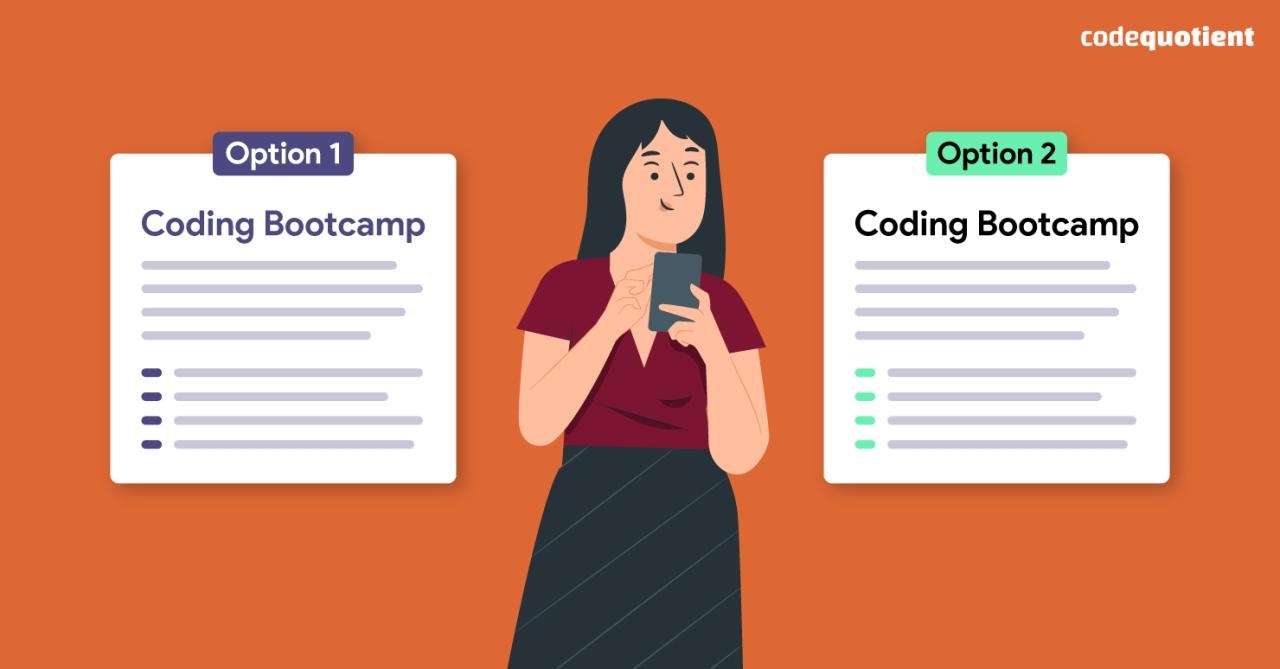Bootcamp Accreditation and Legitimacy: How To Choose A Coding Bootcamp

Choosing a coding bootcamp is a significant investment, both financially and time-wise. Therefore, understanding the accreditation and legitimacy of the program is crucial to ensuring a worthwhile experience and maximizing your chances of career success. Accreditation provides a level of assurance regarding the quality of education and the program’s adherence to certain standards.
How to choose a coding bootcamp – Reputable accreditation bodies offer a valuable benchmark for evaluating coding bootcamps. While there isn’t a single universally recognized accrediting body specifically for coding bootcamps in the same way there is for universities, several organizations provide accreditation or recognition, lending credibility to participating institutions. These organizations often assess factors like curriculum rigor, instructor qualifications, career services, and student outcomes. The absence of accreditation doesn’t automatically disqualify a bootcamp, but it does necessitate a more thorough investigation into its track record and reputation.
Reputable Accreditation Bodies and Curriculum Comparison
Several organizations offer accreditation or recognition for coding bootcamps, although the specific criteria and levels of scrutiny can vary. Some focus on specific aspects of the program, such as career services or curriculum content, while others offer broader accreditation. The presence of accreditation doesn’t guarantee identical curricula across all accredited bootcamps; differences in specializations, teaching methodologies, and project-based learning approaches will still exist. However, accreditation generally suggests a minimum standard of quality and a commitment to providing a robust educational experience. For instance, a bootcamp accredited by one organization might emphasize backend development, while another, accredited by a different body, might specialize in data science. The choice depends heavily on individual career goals.
Researching Bootcamp History and Student Reviews
Thorough research beyond accreditation is essential. Investigating a bootcamp’s history, including its founding date, instructor experience, and overall longevity, provides valuable context. A bootcamp with a longer operational history and a consistent track record of positive student outcomes is generally a safer bet. Student reviews, readily available on platforms like Course Report, SwitchUp, and Reddit, offer invaluable firsthand perspectives on the learning experience, instructor quality, career services effectiveness, and overall satisfaction. Pay attention to recurring themes and patterns in the reviews; a consistent stream of negative feedback should raise red flags. Look for reviews that provide specific details rather than generic statements.
Bootcamp Comparison Table
The following table compares three hypothetical bootcamps, highlighting accreditation status, job placement rates, and tuition costs. Remember that these are illustrative examples, and actual figures vary significantly depending on the bootcamp, location, and year.
| Bootcamp Name | Accreditation | Job Placement Rate (within 6 months of graduation) | Tuition Cost (USD) |
|---|---|---|---|
| CodeCraft Academy | Council on Occupational Education (COE) | 85% | $15,000 |
| TechLaunch Bootcamp | Accredited by the Accrediting Council for Continuing Education & Training (ACCET) | 78% | $12,000 |
| Digital Futures Institute | None (but strong industry partnerships) | 82% | $18,000 |
Career Services and Job Placement
Choosing a coding bootcamp involves careful consideration of its career services and job placement support. A strong program will provide you with the tools and resources needed to successfully transition into a tech career after graduation. This includes not only direct job placement assistance but also comprehensive career development resources designed to build your skills and confidence.
A robust career services program is more than just a job board; it’s a strategic partnership designed to help you achieve your career goals. Effective programs offer personalized support, tailored to each student’s individual needs and career aspirations. This individualized approach maximizes the chances of successful placement and long-term career satisfaction.
Examples of Strong Career Services
Strong coding bootcamps offer a variety of career services designed to support students throughout their job search. These can include resume and portfolio reviews, mock interviews, workshops on negotiation and salary expectations, and access to a network of alumni and industry professionals. Some bootcamps even offer personalized career coaching, helping students identify their ideal roles and develop targeted job search strategies. For instance, a bootcamp might partner with local tech companies to offer exclusive job opportunities to its graduates or organize career fairs specifically for its student body. Another example is the provision of individualized feedback on coding projects, not just for technical correctness, but also for the clarity and presentation of the code, skills crucial for a professional portfolio.
Evaluating a Bootcamp’s Job Placement Assistance
When evaluating a bootcamp’s job placement assistance, it is crucial to examine several key aspects. Firstly, look for transparent reporting of job placement statistics. Avoid bootcamps that use vague or misleading metrics. Instead, seek detailed information about the types of jobs graduates obtain, their average salaries, and the time it takes graduates to find employment. Secondly, investigate the quality and intensity of the career services provided. Are they merely offering a job board or do they provide personalized coaching, workshops, and networking opportunities? Finally, consider the bootcamp’s alumni network and its strength in connecting graduates with potential employers. A strong alumni network serves as a testament to the bootcamp’s commitment to its graduates’ success.
The Importance of Networking Opportunities
Networking is a critical component of securing a job in the tech industry. Coding bootcamps should actively foster networking opportunities for their students. These might include networking events, guest speaker sessions with industry professionals, alumni mentorship programs, and opportunities to collaborate on projects with other students. The ability to build relationships with potential employers and other professionals in the field can significantly increase a graduate’s chances of securing a desirable position. A strong network can also provide valuable insights into the industry, leading to better career decisions and greater long-term success.
Questions to Ask a Bootcamp About Career Services
Bootcamp representatives should be prepared to provide detailed information about their career services and job placement success rate. Statements regarding their career services should include details on the types of support offered, the success rate of graduates finding employment within a specific timeframe after graduation, and the average salary of graduates. Furthermore, statements should address the availability of personalized career coaching, the strength of the alumni network, and the frequency of networking events and industry partnerships. Statements should also address the specifics of their job placement assistance, including the process for matching graduates with employers, the level of support provided during the job search, and the metrics used to measure job placement success.
Cost and Financing Options

Choosing a coding bootcamp involves a significant financial commitment. Understanding the various costs and available financing options is crucial for making an informed decision. This section will explore the different ways to fund your bootcamp education and provide a framework for comparing the overall costs and potential return on investment.
Bootcamp costs vary widely depending on factors such as location, program length, curriculum intensity, and the reputation of the institution. Tuition fees are the most significant expense, but you should also factor in additional costs like living expenses (rent, utilities, food), transportation, books, and personal expenses. A realistic budget should encompass all these factors to avoid financial strain during your intensive learning period.
Financing Options for Coding Bootcamps
Several financing options exist to help individuals cover the cost of coding bootcamps. These options offer varying degrees of flexibility and repayment terms. Carefully consider the implications of each before committing.
Common financing options include:
- Income Share Agreements (ISAs): ISAs are a relatively new option where you pay a percentage of your income after you secure a job, typically for a set period. This can be advantageous if you are concerned about upfront costs, but the percentage and duration of repayment should be carefully examined.
- Student Loans: Federal and private student loans can be used to finance bootcamps. Federal loans often offer more favorable interest rates and repayment options, but require a credit check and approval process. Private loans may have higher interest rates but could offer quicker approval times.
- Payment Plans: Many bootcamps offer payment plans that allow you to spread the tuition cost over several months or even years. This reduces the upfront financial burden but may involve higher overall costs due to interest or fees.
- Scholarships and Grants: Several organizations and bootcamps offer scholarships and grants to deserving students. These are often based on merit, financial need, or specific demographics. Researching and applying for scholarships can significantly reduce your overall cost.
- Employer Sponsorship: Some employers sponsor their employees’ participation in coding bootcamps, either fully or partially covering the tuition costs. This is a valuable option if your current employer supports professional development.
Cost Comparison of Coding Bootcamps
The following table compares the costs of three hypothetical bootcamps. Remember that actual costs vary and should be verified directly with the institutions. This table is for illustrative purposes only.
| Bootcamp | Tuition | Financing Options | Estimated ROI (5 years) |
|---|---|---|---|
| Bootcamp A | $15,000 | Payment Plans, ISAs, Student Loans | 150% |
| Bootcamp B | $18,000 | Student Loans, Scholarships | 120% |
| Bootcamp C | $12,000 | Payment Plans, Employer Sponsorship | 180% |
Calculating Return on Investment (ROI)
Calculating the ROI for a coding bootcamp involves comparing the total cost of the program with the increase in your earning potential after graduation.
A simple formula for calculating ROI is:
ROI = [(Increased Annual Salary * Number of Years) – Total Cost] / Total Cost * 100%
For example, if a bootcamp costs $15,000 and leads to a $20,000 increase in annual salary over five years, the ROI would be: [(20,000 * 5) – 15,000] / 15,000 * 100% = 566.67%. This is a simplified calculation and doesn’t account for factors like taxes, living expenses during the bootcamp, or potential career changes.
Alumni Network and Reviews

Choosing a coding bootcamp is a significant investment, both financially and time-wise. Therefore, understanding the experiences of past students is crucial in making an informed decision. Leveraging alumni networks and carefully reviewing student testimonials can provide invaluable insights into a bootcamp’s effectiveness and overall value.
Exploring the experiences of former students offers a realistic perspective beyond the marketing materials. This allows prospective students to gauge the true value of the program, understand the career support provided, and assess the overall learning environment. By combining this research with other due diligence steps, you can significantly reduce the risk of choosing a subpar program.
Researching Alumni Networks and Success Stories
Many bootcamps actively promote their alumni networks through online platforms like LinkedIn. You can search for the bootcamp’s name along with terms like “alumni,” “graduate,” or “student.” Examining the profiles of alumni can reveal their career paths post-bootcamp, their current job titles, and the companies they work for. This allows you to assess the types of roles graduates typically secure and the success rate of the bootcamp’s job placement efforts. Some bootcamps maintain dedicated alumni pages on their websites, showcasing success stories and testimonials. Actively searching for alumni on platforms like LinkedIn provides a broader and potentially more unbiased view.
The Value of Student Reviews and Testimonials
Reading student reviews and testimonials offers a candid perspective on a bootcamp’s strengths and weaknesses. These reviews can illuminate aspects of the learning experience not always highlighted in official marketing materials. For example, students may discuss the quality of instruction, the effectiveness of the curriculum, the support provided by instructors and staff, and the overall learning environment. Sites like Course Report, SwitchUp, and Reddit often host numerous reviews from past bootcamp students, providing a valuable resource for research.
Red Flags in Online Reviews, How to choose a coding bootcamp
While online reviews are helpful, it’s important to approach them critically. Be wary of reviews that seem overly positive or negative, lacking specific details. A consistent pattern of overwhelmingly positive reviews might indicate that the reviews are fabricated or selectively displayed. Conversely, an abundance of extremely negative reviews warrants further investigation. Look for reviews that provide specific examples and details to support their claims. Also, pay attention to the consistency of negative feedback. Multiple reviews citing the same issues, such as poor instruction or lack of career support, should be taken seriously.
Questions to Ask Current Students or Alumni
Before enrolling, consider reaching out to current students or alumni to gather firsthand information. A structured approach to your inquiries will yield the most insightful responses. Here are some questions to ask:
- What was the most valuable aspect of the bootcamp’s curriculum?
- How effective was the career services support in helping you find a job?
- What were the biggest challenges you faced during the program, and how did the bootcamp address them?
- Would you recommend this bootcamp to others, and why or why not?
- What advice would you give to prospective students considering this bootcamp?


Tim Redaksi